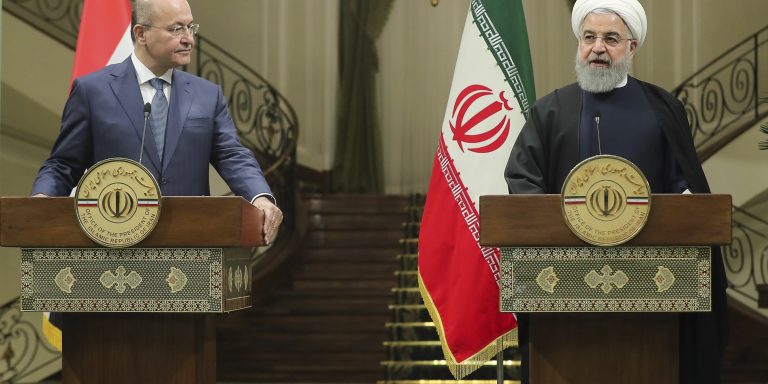INTELBRIEF
March 4, 2019
IntelBrief: Iran Seeking to Further Its Influence in Iraq

- Iran has built leverage over Iraq’s key power centers and its economy through its arming of Iraqi Shia militias and supplies of natural gas.
- The growing prospects for a U.S. military drawdown in Iraq are causing Iraqi leaders to draw closer to Iran than they were previously.
- Trump administration pressure on Iraqi leaders to back U.S. policy against Iran is building, not diminishing, support for Iran inside Iraq.
- The political rise of pro-Iranian Shia militia commanders in Iraq is setting the conditions for a potential comeback by the so-called Islamic State.
.
The uncertainty surrounding the Trump administration’s commitment to Iraq’s stability and sovereignty has enabled Iran to expand its already significant influence in that country. Iraq’s leadership believes that the withdrawal of most U.S. forces from Syria portends a similar drawdown for Iraq. Pro-Iranian political figures in Iraq—many of whom already argue that Iraq should be pivoting more toward Tehran than Washington—have stepped up efforts to force the United States to withdraw. Many of these figures have successfully capitalized on resentment over President Trump’s recent actions and comments. He did not meet with Iraqi leaders during his brief December 2018 visit to an Iraqi military base that hosts U.S. forces, and, on February 3, 2019, he stated that some U.S. troops might remain in Iraq to ‘look a little bit at Iran because Iran is the real problem.’ Iraqi officials have consistently resented U.S.-Iran competition in Iraq. The February comment by the president specifically contradicts a provision of the 2008 U.S.-Iraq Security Agreement, which forms the basis for the U.S. presence in Iraq and forbids the United States from using Iraq as a base from which to attack Iran.
Even pro-U.S. Iraqi politicians have resisted the U.S. insistence that Iraq join the U.S. economic pressure campaign against Iran—doing so would damage Iraq’s economy. The administration has threatened to sanction Iraq unless it ceases importing Iranian natural gas, although the gas is crucial to Iraq’s ability to generate electricity. Major protests have broken out in Iraqi cities in recent years, especially during the summer months, due to power failures and their devastating effects. U.S. officials want Iraq to find alternatives to Iranian gas, diversifying to U.S. allies such as Qatar, but transportation costs will almost certainly make any alternative more expensive. The supplies from Iran flow easily to Iraq via joint pipelines. The administration’s pressure on Iraq fails to consider that Iran's light industry economy has become the source of many goods imported by Iraq, including basic medicines, construction materials, and processed foodstuffs. This has allowed Iran to spread its influence through cultural diffusion and soft power.
Iran already has a strong political base in Iraq on which to exploit any Trump administration missteps. Since the early 1980s, when Saddam Hussein was still in power, Iran's Islamic Revolutionary Guard Corps (IRGC) has been arming and funding an array of Iraqi Shia factions and their military wings. These militias expanded during the U.S. occupation period 2003-2011 and in response to the challenge posed by the so-called Islamic State in 2014. These groups have largely ignored a 2016 law to integrate into the national armed forces of Iraq, and are widely accused of continued abuses and retribution against Sunni Iraqis in areas that supported the Islamic State. The leaders of these factions, including the Badr Organization’s Hadi al-Ameri and Asa’ib Ahl al-Haq’s Qais Khazali, have emerged as powerful, elected national leaders wielding significant political influence in Iraq. These faction leaders have pointed to the U.S. drawdown in Syria as evidence that Iraq needs to rely on Iran, and not on a retrenching United States that is increasingly seeking to extricate itself from the region.
The polarization of Iraq’s political structure into pro-Iranian and pro-U.S. camps threatens to undermine Iraqi stability and perhaps set the stage for a renewed threat from the Islamic State. Iranian advice to former Iraqi Prime Minister Nuri al-Maliki to marginalize Sunni leaders contributed to the Islamic State’s success in 2014. A repeat of Iran-orchestrated oppression against Iraqi Sunnis in 2019 is likely to have a similar result, once again inflaming deep-seated sectarian grievances and helping to fuel the Islamic State’s narrative. This is especially true insofar as the Islamic State has not been eliminated, but instead has reverted to its pre-2014 insurgent posture in rural areas of Iraq.
.
For tailored research and analysis, please contact: info@thesoufancenter.org
[video width="960" height="540" mp4="https://thesoufancenter.org/wp-content/uploads/2019/03/IB-0304.mp4" poster="https://thesoufancenter.org/wp-content/uploads/2019/03/AP_18321400676716.jpg"][/video]